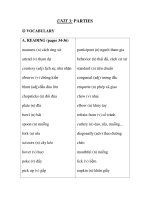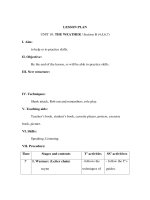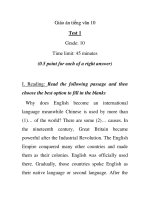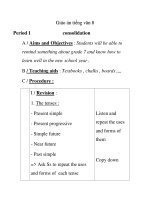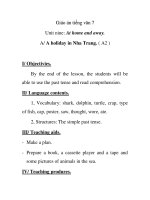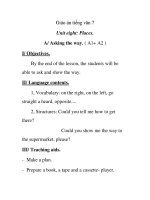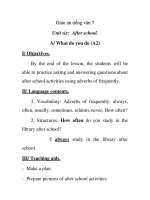Giáo án tiếng anh lớp 7: Test 1 Grade: 10 Time limit: 45 minutes (0.5 point for each of a right pot
Bạn đang xem bản rút gọn của tài liệu. Xem và tải ngay bản đầy đủ của tài liệu tại đây (62.19 KB, 14 trang )
Giáo án tiếng văn 7
Test 1
Grade: 10
Time limit: 45 minutes
(0.5 point for each of a right answer)
I. Reading: Read the following passage and then
choose the best option to fill in the blanks
Why does English become an international
language meanwhile Chinese is used by more than
(1)… of the world? There are some (2)… causes. In
the nineteenth century,
Great Britain became
powerful after the Industrial Revolution. The English
Empire conquered many other countries and made
them as their colonies. English was officially used
there. Gradually, those countries spoke English as
their native language or second language. After the
World War II, the United States, one of the Englishspeaking (3)… , become the most powerful and so
then more people speak English. English grammar is
rather easy and simple compared (4)… other
languages. However, English learners, even the
native speakers, sometimes have troubles with
English (5)… . That can be overcome. A lot of
teaching methods are available to help them.
1. A. fifth-one
B. one-fifth
C. first-fifth
D. one-five
2. A. uneasy
B. main
C.
unreasonable
D. mean
3. A. cities
B. distances
C. states
D.
C. with
D.
countries
4. A. on
B. from
in
5. A. written
D. spoken
B. spelling
C. dictation
II. Speaking: Match each of the sentences in A with
a suitable response in B. Then write the dialogue in
full form.
A
B
1. Wow! I guess you a.
were tired on Sunday.
She
went
to
her
grandparents’ house on
2. Where was Hoang Saturday morning. Then
she spent the whole
Anh?
3. Where did you both
go?
4. Hey, Huong. Where
were you last Saturday
morning? I called you but
you weren’t home.
5. Yeah? How was it?
6. I thought you were
afternoon
cleaning
her
apartment.
b. Really tired. I slept all
morning and watched TV
all afternoon.
c. It was really fun. We
danced for hours.
d. She had to go to her
meeting Hoang Anh on office to finish her report.
Saturday afternoon.
She
spent
the
whole
afternoon there, so I met
her that night instead.
e. We went dancing at the
new nightclub downtown.
f. Oh, I went to the
bookstore to buy her a
birthday present for my
younger brother.
III. Writing: Use the prompts below to write
complete sentences about Nguyen Trai
1. born/ in 1380/ Thang Long/ now/ call/ Hanoi/ he /
not only/ national hero/ but also/ great poet/ he/
devote/ all/ life/ country’s independence/ freedom
2. during/ schooldays/ educate/ by/ his father/
scholar/ and/ village school teacher.
3. he/ help/ Le Loi/ end/ the Ming aggression/ after/
victory/ write “Binh Ngo Dai Cao”/ which/ praise/
people’s heroism/ and/ look forward/ bright future/
Vietnam.
IV. Listening: Listen to the teacher’s reading, then
choose the best option to complete these sentences.
In the United States and Canada, it is very
important to look a person directly in the eyes when
you are having a conversation with him or her. If you
look down or to the side when the other person is
talking, that person will think that you are not
interested in what he or she is saying. This, of course,
is not polite. If you look down or to the side when
you are talking, you may appear to be hiding
something; that is, it might seem that you are not
honest. However, people who are speaking will
sometimes look away for a few seconds when they
are thinking or trying to find the right word. But they
always turn immediately back to look the listener
directly in the eyes. These social “rules” are the same
for two men, two women, a man and a woman, or an
adult and a child.
1. In the US and Canada, when you are having a
conversation with someone,……
A. do not look directly in the eyes
B. you should look him or her directly in the
eyes
C. it is impolite to look at the eyes of the speaker
or hearer
D. a and b
2. If you look down or to the side when the other
person is talking………………
A. you will be thought to be not interested in the
conversation
B. you are very polite
C. you are very interested in what is being said
D. you are the interesting person
3. If you look down or to the side when you are
talking,……………
A. the Americans are interested in you
B. you are very polite
C. you are thought to be dishonest
D. you are interested in the conversation
4.
The
speaker
will
sometimes
look
away………………..
A. because he or she wants to end the
conversation
B. because the hearer is interested in what is
being said
C. because he or she thinks that the hearer is not
honest
D. because they are thinking or finding the right
word
5. These social “rules” are……………….
A. for men only
B. for children only
C. for women only
D. the same for everybody
The 18th period
Date:
Correct the test
I. Objectives:
After this correction students will be clearer about
the test they have just done. And have to know how
to try their best for the next test.
II. Method: Integrated, mainly communicative
III. Teaching aids: board, the test paper, key for the
test
IV. Procedures:
Teacher’s activities
Students’
Notes
activities
Warm-up: (5 minutes)
- Greeting
-
Ask
- Greeting
students
some -
Listen
and
questions on the previous understand
the
test
task
- Tell the aim of the period: - Get ready for
correct the test
the lesson
I. Reading (10 minutes)
- Repeat the question
- Get students to read the - Look at their
passage again carefully
paper
- Call some students to read -
Compare
the
out their answers, and the resutls with the
others give remarks if it is others
correct or not.
- Get the correct
- Finally read the keys out answers from the
aloud
Keys: 1.B – 2. B – 3.D –
4.C – 5.D
keys
II. Speaking (10 minutes)
- Repeat the question
- Get student to read the
test again carefully
- Look at their
- Call some students to read paper
out their answers, and the - Compare the
others give remarks if it is results with the
correct or not
others
- Finally read the keys out - Get the correct
aloud
answers from the
Keys: 1.B – 2.A – 3.E – 4.F keys
– 5.C – 6.D
III. Writing (10 minutes)
- Repeat the question
- Get students to read the
writing again carefully
- Call some students to - Look at the
write their answers on the writing again and
board, and the others give compare it with
remarks if it is correct or the others
not
-
Correct
the
- Finally read the keys out wrong sentences
aloud
Keys:
1. Nguyen Trai was born in
1380 in Thang Long, now
called Hanoi. He devoted
all his life to the country’s
independence and freedom.
2. During his schooldays,
he was educated by his
father, a scholar and a
village school teacher.
base on the key
3. He was so brilliant that
he got a Doctor’s degree at
the age of twenty.
4. He helped Le Loi to end
the Ming aggression. After
the victory, he wrote “Binh
Ngo
Dai
praised
heroism
Cao”,
our
and
which
people’s
looked
forward to a bright future
for Vietnam.
- Listen to the
V. Listening (10 minutes) teacher’s reading
- Repeat the question
carefully
- Show the listening script - Try to get the
on the board or read the correct answers
passage again several times - Compare with
- Get students toread the the
passage again carefully
other
classmates
- Call some students to - Compare with
write their answers on the the keys
board, and the others give
remarks if it is correct or
not
- Finally read the keys out
aloud
Keys: 1.B – 2.A – 3.C –
4.D – 5.D
